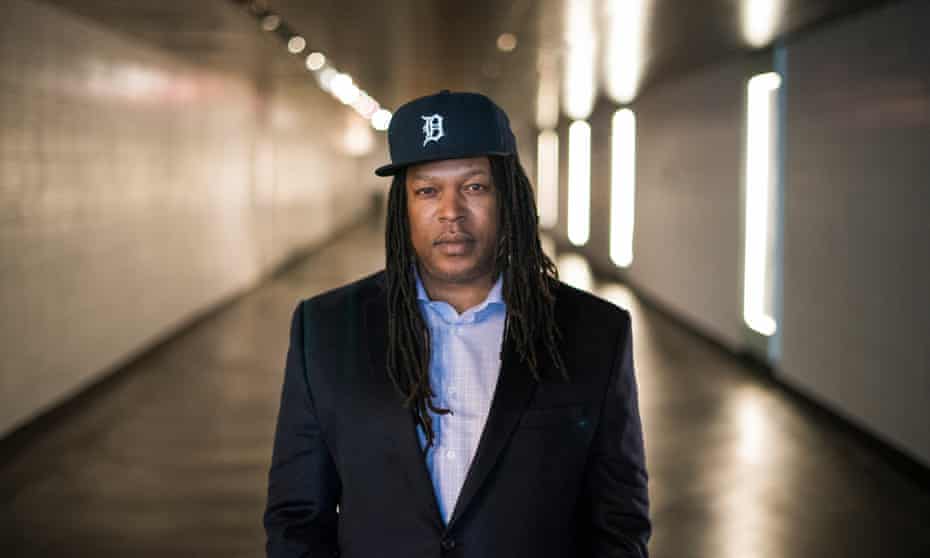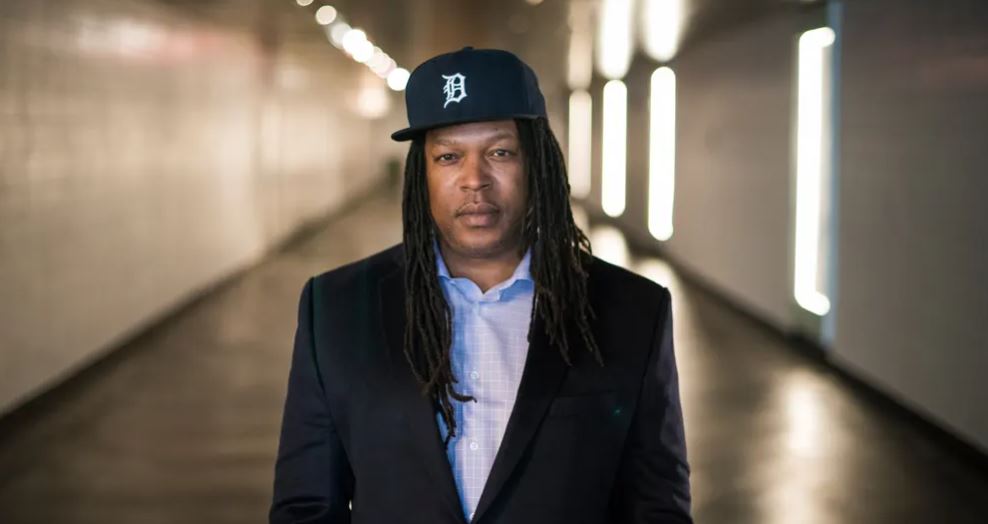‘I’ll never leave your side’: his father’s letters helped him endure 19 years in prison

In his second book, Shaka Senghor wants his collection of letters to ‘empower my sons with my truth’
As Shaka Senghor was serving 19 years in prison for murder, a letter from his father gave him the strength to endure and eventually reform. “I’ll never leave your side,” Senghor’s father wrote to him, after Senghor told his family, in a letter written from solitary confinement, that they should move on with their lives without him.
Senghor explored his road to redemption in his New York Times best-seller Writing My Wrongs: Life, Death, and Redemption in an American Prison. At 19, Senghor was convicted of second degree murder after shooting a man during a drug deal in Detroit. He was released from prison in 2010 and since then has been a MIT Media Lab Director’s Fellow, delivered a TED Talk in 2016 that has collected more than 1.6m views and been featured on Oprah Winfrey’s SuperSoul 100.
Letters played a big role in your own redemption and transformation. Why did you decide to write this book in the form of letters versus other narrative styles?
My transformation really started with letters from my dad. He is a beautiful letter writer and he would write me five to six page handwritten letters about life. We did a lot of healing and growing together and challenging ideas through our letters. And in my toughest moments in prison, I would go back and reread his letters as a reminder that there was someone on the other side of the four walls who really cared about me. Someone who loved me, loved me unconditionally. Through our letters, we were able to really be honest and very transparent with each other. He could admit the areas where he felt he came up short and I could accept my failures and be accountable and free him from the oppressive thought that it was his fault I landed in prison. I felt like the intimacy of the letters between my dad and I were something we just don’t see: an honest and emotional exchange between Black men. I thought, if I could ever write something to my sons that they could go back to, the way I went back to the letters with my dad, their lives would be good.
When I began to put the letters together, it was before the social unrest we witnessed globally. When I put my first proposal together, it was in late 2019, I was thinking about the narrative around Black men and this negative story that kept being told. We’re framed like we are America’s problem; we’re the Black community’s problem; we’re Black women’s problems; we’re everybody’s problem and nobody’s solution. It really bothered me because I know so many incredible Black men. Originally the letters were going to be addressed to different sons: my hip-hop sons, my non-binary confirming sons, my entrepreneurial sons. Then as I thought about it, I thought, “I need to write these letters to my sons because between these two worlds are the many sons I encounter.”
Your oldest son, Jay, is 29 and your youngest, Sekou, is 10. How have they responded to what you’ve written?
Jay does not want to read the book. He is so nonchalant and in his own world. I realized that I can’t insert myself into his life in a way that he hasn’t given me permission to do. So I make the offering, and whatever he chooses to do, I’m cool with. With Sekou, it’s different because some of the content is more mature than where he is at. He did read some and had the best reaction ever. He was so amused that my dad once bought me some fake Jordan (sneakers). He was just like, “Not the Pro Wings.” It was a special moment.
Do you see this book as a parenting guide for Black boys? Or do you expect it to have a wider resonance?
This is a book that white fathers and sons should consume, too. Oftentimes they are in those positions that are systemically oppressive to people who don’t look like them. It’s really important for white dads to understand that Black fathers want the same things for their sons: safety, well-being, the ability to thrive and not just survive. The biggest thing I want (all) to take away is the power of love – the emotional accessibility that we owe ourselves and owe our sons and how impactful it is when you can open up. Love is truly our power and is the source of all things great.
You wrote a letter unpacking isolation and you draw a parallel between being in solitary confinement in prison and the isolation of the early days of the pandemic. What took you there?
When the global pandemic first began and people started going into lockdown, I saw a lot of people struggling. Whenever people would reach out to me, they’d say I feel bad because you dealt with real isolation going through solitary confinement. And I’d say: “No, this is real. There is not a comparison to make, but there are similar themes.”
I remember one day, I was in my office and was getting off my fifth Zoom meeting. I had ordered food in. I felt a sense of the room closing in on me. I realized I was triggered and my mind had gone back to a previous experience – my prison experience. It felt just like when they would bring your food to the cell. And this is where you’ll be and you can’t go anywhere. And so I had to leave, to remember, I can get out of here. Isolation happens in many forms.
You spent about seven years combined in solitary confinement for various reasons and during that time found meditation, discipline and hope.
I remember writing to my dad and telling him I think I’m going to die in this place and they are never going to let me out. I want you to go on with your life and take care of Jay and the family. I wrote him an honest letter because I thought my life was over and I didn’t want to see him suffer as a result of my suffering. My dad wrote me back and told me that while he wished I wasn’t in solitary confinement he had no judgment. He told me that no matter how long I was in prison he wouldn’t leave my side and would always have my back. I read the letter so many times because it affirmed me and kept me strong on so many days.
You write about trauma, abuse, alcohol and drug addiction, among other serious topics. Why did you want to broach these issues with your still young sons?
Prison is designed to lay you bare. It dehumanizes you in such a way and it strips you. Once you reconcile that, you can live with any truth. There are conversations that our community does not have with children. There is this old model … and we tiptoe around a lot of topics.
I’m a parent, a dad and I mentor kids all over the country. I go into these schools and these 12-year-olds, 13-year-olds, they are watching everything on social media. Their conversations are hyper-mature but in a very toxic way. My responsibility is to empower my sons with my truth and that truth comes through my own vulnerability.
Because I have a public life and I’ve been convicted of a very serious crime … kids could say things to my youngest son. I had a fear that someone could say to him, “your dad is a murderer”, without him having any context it would hurt him. So for me, the responsible thing to do is to speak the truth. I want to be real with both of them. [They] already know the worst thing I’ve done in my life. So for me, the rest of the topics are not hard conversations to have.
When I think of a whole Black boy the first thing that comes to mind is an image of Sekou dancing to old-school soul music. I imagine a boy who is full of joy and that is able to explore the world with curiosity and be unimpeded in his quest to learn, to have fun, to contribute, to have agency over his body and thoughts. To be able to give love and receive love without it being filtered through a lens of trauma or skepticism. To really smile freely, smile in a way that makes other people smile when they walk in the room. Somebody that can express themselves and has full access to their emotions. There’s nothing more beautiful than when my son comes up to me and says he needs a hug. He’s so funny to me – he says: “Dad bring it in, bring it in.” That freedom of emotional access, that is wholeness to me.


